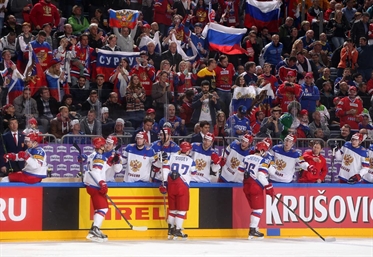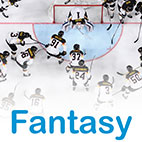Playing with power?
Playing with power?
Don’t read too much into man-advantage prowess

 COLOGNE, GERMANY - MAY 7: Russia's Nikita Kucherov #86, Vadim Shipachyov #87 and Vladislav Namestnikov #90 celebrate at the bench after a second period goal against Italy during preliminary round action at the 2017 IIHF Ice Hockey World Championship. (Photo by Andre Ringuette/HHOF-IIHF Images)
COLOGNE, GERMANY - MAY 7: Russia's Nikita Kucherov #86, Vadim Shipachyov #87 and Vladislav Namestnikov #90 celebrate at the bench after a second period goal against Italy during preliminary round action at the 2017 IIHF Ice Hockey World Championship. (Photo by Andre Ringuette/HHOF-IIHF Images)
That honour belongs to Canada, which hammered host Latvia 11-0 in Riga on 11 May, 2006. The Canadians got nine man-advantage goals from nine different skaters, including Sidney Crosby, Patrice Bergeron, and Brendan Shanahan. (The Latvian fans so disliked the officiating that they littered the ice with debris, including shoes, coins, and cell phones – not a recommended practice.)
Heading into Monday’s game against Germany, Russia’s power play is clicking at 75 percent (6-for-8). Clearly, that conversion rate isn’t sustainable. But how far does a top-ranked power play go toward winning this tournament?
Frankly, it’s just one part of the equation. Last year, Denmark boasted the best PP percentage at 34.4 (10-for-29). The Danes achieved their second quarter-final berth ever, finishing eighth, and their power play, driven by Nikolaj Ehlers and Nicklas Jensen, was a big key. Yet ultimately, they weren’t ready to challenge for a medal, bowing 5-1 to Finland in the quarter-finals.
In 2015, champion Canada clicked at a tournament-high 33.3 percent (12-for-36), followed by silver-medalist Russia 32.1 (9-for-28). But the Canadians also allowed just one power play goal, and their goalies’ cumulative save percentage of 93.3 was second only to Finland’s (93.6). So it was a two-way effort.
You might assume that the Swedes had a stellar PP in 2013 when they broke the 27-year-old “home ice curse” by winning gold in Stockholm – especially with the Sedin twins leading the final charge. Instead, coach Par Marts’s team ranked a nondescript 10th overall (16.2 percent, 7-for-43). In 2010, the Czechs, who surprised everyone by edging the stacked Russians for gold with a relatively modest roster, were only seventh overall (16.6, 7-for-42).
Hence, even on the big rink under IIHF rules, the same adage applies as in the NHL: “Defence wins championships.” That '06 Canadian team, despite its PP explosion versus Latvia, wound up fourth. Russian fans dreaming of their first World Championship gold since 2014 should really hope their team continues to surrender just one goal per game.
Back to Overview
































































































